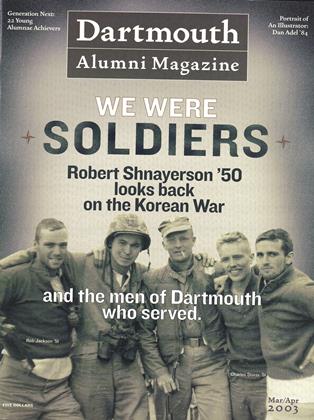IMAGINE SIX ASTRONAUTS ON A mission to Mars living together for three years in a compartment no larger than a mobile home, unable to call home or step outside for a breath of fresh air. The quarters may be cramped, but there's plenty of room for conflict and depression. And with no psychiatrist aboard, forget about getting professional help.
That's why Dartmouth researchers are developing a new self-help shrink service a crew can take into space. Led by research psychologist James Carter and physician and astronaut Jay Buckey, a five-member team from Dartmouth-Hitchcock Medical Center is designing a computer-based multimedia system that will help astronauts prevent, assess and manage social and emotional problems. With $400,000 from the NASA-affiliated National Space Biomedical Research Institute, the team expects to complete its project—called the "Smart Medical System for Psychosocial Support"—by fall.
If NASA adopts the system, all an astronaut will have to do is pop a CDROM—or its future equivalent—into a personal laptop computer for confidential, interactive counseling. A series of multiple-choice questions will guide the user to a multimedia array of therapeutic and problem-solving resources, including video clips of former astronauts offering "words of wisdom, advice arid encouragement," says Carter.
Baring the soul to a computer has some advantages over face-to-face therapy, he adds. Studies by psychologists and psychiatrists have shown that many people who hide problems/from others will admit their troubles to a computer. Astronauts tend to "thrive on a sense of selfsufficiency. They don't want to highlight the fact that there is a problem by having to talk to ground crew," Carter says. Besides, transmission between Mars and Earth takes 24 minutes each way.
Whether or not a manned Mars mission ever gets off the ground, Carter sees computer-based treatment as a boost to psychotherapy closer to home. In as little as 10 years, he predicts, computerbased therapy could be used on polar research bases, oil rigs and other outposts as well as in schools, prisons, clinics and underserved communities. "There will never be enough mental-health professionals to meet demand," says Carter. "I would love this to be able to fill needs that aren't being met."
Who would you like to have as a commencement speaker at your graduation ceremony this June? "Rudy Giuliani, I think that he has a great sense of leadership and poise. He expresses sympathy yet leadership at the same time." —Heather Botdf'03 "Bill Gates. He is a wealthy businessman and that's what I want to be." —Evan Brennan '03 "Hillary Clinton. She's a controversial female with strong opinions." —Carrie Levy '03 "George Bush, so I could heckle him." —Ryan McDermott '03 "My dad. He's from the class of 1970 and he's really successful—and he paid his way through Dartmouth." — Charlotte Haldeman '03 "Peter Jennings. He knows what's important in America today." —Elsa Sprunt '03 "David Letterman. He would be amusing but has intelligent humor that suits Dartmouth." —Juan Romera '03
 View Full Issue
View Full Issue
More From This Issue
-
 Feature
FeatureWomen on the Verge
March | April 2003 By Jennifer Kay ’01 -
 Feature
FeatureWe Were Soldiers
March | April 2003 By CASEY NOGA '00 -
 Cover Story
Cover StoryRemembering America’s Forgotten War
March | April 2003 By ROBERT SHNAYERSON ’50 -
 Feature
FeaturePortrait of an Artist
March | April 2003 By Jake Tapper ’91 -
 Alumni Opinion
Alumni OpinionLoaded Canon
March | April 2003 By Dinesh D’Souza ’83 -
 Article
ArticleSeen & Heard
March | April 2003 By MIKE MAHONEY '92







